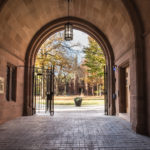In her new book, The Love of Learning: Seven Dialogues on the Liberal Arts, Margarita Mooney—Associate Professor at Princeton Theological Seminary and Executive Director of the Scala Foundation—joins in conversation with seven scholars who share the stories of how they each fell in love with learning. The Love of Learning, which will be published by Cluny Media on June 15, invites readers to join the long, ongoing conversation about truth, goodness, and beauty that has its roots in great thinkers of Western civilization and has adapted to various contexts while retaining a vibrant tradition.
Today, Public Discourse is publishing an excerpt from the book. This conversation features Elizabeth Corey, Associate Professor of Political Science at Baylor University and director of its Honors Program. Corey, like Mooney, is a long-time contributor to Public Discourse. In this excerpt, Corey and Mooney discuss how the liberal arts tradition can help students experience a vision of the good and grow in authentic friendships in which love is connected to a shared pursuit of truth.
Margarita Mooney: The first article of yours that I read has the same name as this dialogue, “Learning in Love.” When people think about liberal learning, they are not usually thinking about love. Why did you write it? What do you hope that people take away from it?
Start your day with Public Discourse
Sign up and get our daily essays sent straight to your inbox.Elizabeth Corey: I wrote the piece back in 2014, in reaction to a report called “The Heart of the Matter,” a manifesto about the importance of learning the humanities. I found it full of platitudes and empty words, talking about the importance of liberal education in a way that made me think: “If this were supposed to encourage people to go toward the liberal arts it would do the exact opposite. I would rather not be involved in this at all.”
I asked myself what did interest me in the liberal arts and realized that there were a number of people who modeled for me a life that was attractive to me.
This is how people grow to love liberal arts, not by being told that it’s good for you or that everybody should have a certain education because that’s what civilized people do. It is to be “evangelized,” to be shown, to be led, to be brought to an understanding of why reading these books and thinking and talking in these ways is important in itself.
That is best modeled through person-to-person conversation: in the classroom, in the seminar room, in the living room. Many professors do this, such as by inviting students to their homes to have tea or a meal. Suddenly, the life of learning isn’t just this thing you do at college, but in every aspect of your life.
MM: One of the books that helped me rethink my own approach to life and to learning was Josef Pieper’s Leisure: The Basis of Culture (1948).
EC: This book is one of the best. Pieper argues that we’ve forgotten how to be leisurely. He sets out various definitions that are not the “real” understanding of leisure. It’s not, “I’m going to spend my leisure time sitting on my back porch with a drink in my hand.” Leisure is not mere rest, or rest so that you can do more work in the future. It is a categorically different kind of activity from work, and it requires a contemplative attitude that has to be cultivated. You have to learn what it is, why it’s attractive, and then how to do it.
He contrasts that with where we are now, what he calls a world of “total work”; all of our striving is oriented toward work, achievement, money-making, honor. We want to be published in the best places. We want to be at the best schools. We want to be at the best companies. We want to be constantly more and more excellent. Pieper finds this striving to be a rather dreadful way of living. He makes a distinction between the person as a “functionary” and the person as a “full human being” who can observe the Sabbath and celebrate and understand what leisure is. He also talks about how hard it is to cultivate that attitude in the present day.
My other very important influence in thinking about achievement is Michael Oakeshott, a British political philosopher who lived from 1901 to 1990. Throughout his work, he meant to show the limits of achievement in human life. In his essay “Work and Play,” he argues that the role of work is first to satisfy needs but then to satisfy wants, which are limitless. Work never ends because we’re constantly looking for the next thing, and after we get that next thing, then we’re looking for the next, next thing. Oakeshott contrasts work with play. Unlike work, which consists in the endless pursuit of wants, play consists in self-sustaining endeavors: love, friendship, conversation, liberal learning, artistic aesthetic experience—all these things that the liberal arts try to promote.
This is how people grow to love liberal arts, not by being told that it’s good for you or that everybody should have a certain education because that’s what civilized people do. It is to be 'evangelized,' to be shown, to be led, to be brought to an understanding of why reading these books and thinking and talking in these ways is important in itself.
MM: Do you find that you get to apply these ideas to your work as a professor? For your students, is it actually possible to live in this leisurely way?
EC: It is very hard to do in the modern world, and it’s harder the older you get and the more responsibilities you have. The world pushes us toward constant activity, attention to emails and text messages, and all the demands of all the people we know in our lives.
I always ask my students if there is anything that they do for its own sake, such as a class that they’ve loved that wasn’t going to affect their future prospect for a career. That’s getting to the kind of leisure that Pieper and Oakeshott are talking about: doing something without a thought for what’s going to follow it. We do have experiences of these leisured modes of activity (listening to music is usually that), but almost all of us get in this compulsive, list-making mode that’s very hard to escape.
I’m not only trying to show younger people the futility of a life based on achievement, but to show that there are ways of thinking about achievement that are better for your soul. One of them is to see your desire to achieve as being inspired by a vision of the good. Ultimately, in the highest things, you end up not thinking about yourself. Once you become excellent at something, whether that’s teaching or writing or being a tax attorney or being a doctor, you’re actually looking for the good of other people. It’s about how you make the lives of others better and encourage them in their pursuits.
MM: You taught a course for the American Enterprise Institute called “Defending Disinterest” and wrote a wonderful piece on defending disinterest in the university. What does a disinterested university look like?
EC: “Defending Disinterest” comes out of a notion called modality, which was a big idea of Michael Oakeshott’s. There are ways of looking at university education in different modes. We are all quite familiar with two iterations of the practical mode. One is the university as a means to a flourishing economic life. The other is as a vehicle for advocating certain political and social causes. Jonathan Haidt has called this a “social-justice university.” For both of these, your time at the university is understood as a means to something else that you will go on and do later.
Against all that, I argue that we ought to understand the university as “disinterested.” Let’s use our time to understand what is out there to be understood. Let’s read great books. Let’s learn math. Let’s explore science. Let’s do all the things that a university affords for us without thinking about how to use this in the future. Let’s enjoy. Can these two different understandings of a university coexist? Some people say no, you’ve got to do either one or the other, but I’m hoping that at many universities there is a place for both.
I’m not only trying to show younger people the futility of a life based on achievement, but to show that there are ways of thinking about achievement that are better for your soul. One of them is to see your desire to achieve as being inspired by a vision of the good. Ultimately, in the highest things, you end up not thinking about yourself.
MM: How might this notion of the university as a place of disinterest look for students for whom achievement might be more important given their socio-economic background of limited resources?
EC: Here’s where I do think those two ends can coexist. I’m not saying that the students shouldn’t do anything useful after college, or that they shouldn’t try to have really great careers. I hope they do. What I am arguing is that achievement can coexist with an intensive liberal arts, conversational, disinterested education.
The danger often lies with the students’ parents. My husband and I often do orientation talks for Baylor, and parents will say, “I’m worried that any time that’s spent in this ‘uselessness’ is going to harm my son or daughter. Why would he or she take the time out to read these books that seem to have nothing to do with his or her future life?”
What we say in response is that it’s not all about career; the questions that come up in these books are, “What is love? What is a worthwhile life? How should I approach death? Is there life after death?” To say that those questions are not important does not do justice to the full humanity of our students.
MM: One of the concerns I have with the activist model of education is that if the end of education is to change our current world, then there’s almost no reason to study the past other than perhaps to critique it. There’s no concept that history or tradition has some intrinsic value in being understood. I think we need teachers who can show how the classics like Plato and Augustine help us get to fundamental human questions that are timeless. To have a coherent identity, the human person needs to connect their own interior life and social location to the past, present, and future.
Is this model of disinterested education, where our special gifts become the way we serve others, possible in our current system where self-interest is touted so highly?
EC: I think it is possible. However, because we are constantly concerned about our lives and our future prospects—all of these very normal and appropriate concerns—it seems almost artificial to do what I’m asking in disinterested education, but it’s very valuable. It requires us to set aside those very pressing human interests for a while.
MM: How do you cultivate friendships centered on the life of the mind in the classroom that acknowledge students’ many sources of identity in a way that builds unity, not fragmentation?
EC: Relating to people’s very diverse experiences requires a willingness to try to throw yourself into the mind and heart of somebody who is not you. Sometimes it is the hardest thing in the world to say, “I need to see the world through this person’s eyes, somebody who I don’t agree with or don’t even like.” Still, to try to understand the world as he or she sees it is the best thing for cultivating friendships. By doing so, you can begin to explore why you might even have a reason to like him or her. A fundamental attitude of both humility about your own views and charity toward others is the best foundation for friendship.
MM: Is it hard to have personal relationships with students when certain groups are demonized on campuses because they fall out of line with a supposedly orthodox view on something? How is it possible to build authentic friendships when on many campuses people are hostile and suspicious of one another?
EC: It has become infinitely harder to navigate these matters in the last ten years or so. While Title IX has done some good things, it’s also made it such that personal relationships are looked at as potential sources of danger. The loss in not being able to have those kinds of close relationships, especially between professors and students, is substantial.
In this day and age, we can be intentional about having students over with our families, going to church with them, or meeting at the Starbucks on campus. Getting out of the classroom or the teacher’s office—any of these official spaces that make us see each other only as teacher and student—is very beneficial. There are ways of making it work.
MM: This brings us back to the importance of leisure, about slowing down the mind and reflecting on your interior to be able to enter into those conversations. We should not always enter an encounter with the motive of debating or putting down another’s views, which is really wearing on students’ friendships at college right now. We should learn to listen, to really understand, first. That is key to developing authentic friendships—friendships that aren’t about utility, but rather about deep connection, about seeing the other person as he or she is and wants to be seen.














